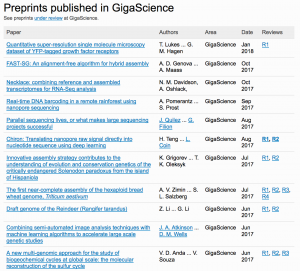Preprint.Space, The Final Frontier
Open Science Trek, The Next Integration
 Fostering and promoting more open and transparent science is one of the goals of GigaScience, and to do this we have been big promoters of open peer review as well as preprints servers. Combining both of these, Academic Karma was the one of the first platforms to focus on open review of preprints, and has helped facilitate this over the past 3 years. We were early users and promoters of the platform, however, a number of alternative platforms have emerged recently for open review of preprints and a new iteration has launched to focuses on providing pre-submission services to preprint authors. Now re-launched and rebranded as Preprint.Space, whereas Academic Karma focused on the reviewer, the platform now aims to maximise the benefits of using preprint servers, particularly with focus on helping authors publish robust results faster using preprints.
Fostering and promoting more open and transparent science is one of the goals of GigaScience, and to do this we have been big promoters of open peer review as well as preprints servers. Combining both of these, Academic Karma was the one of the first platforms to focus on open review of preprints, and has helped facilitate this over the past 3 years. We were early users and promoters of the platform, however, a number of alternative platforms have emerged recently for open review of preprints and a new iteration has launched to focuses on providing pre-submission services to preprint authors. Now re-launched and rebranded as Preprint.Space, whereas Academic Karma focused on the reviewer, the platform now aims to maximise the benefits of using preprint servers, particularly with focus on helping authors publish robust results faster using preprints.
Forming partnerships and integrating with repositories and platforms has enabled us to quickly adapt and respond to the challenges and developments that publishing at the front line of data-driven research entails. Leveraging open source software and APIs, we have managed to build a pipeline connecting a number of these platforms, including bioRxiv, protocols.io, CodeOcean, and Publons. We are please to announce that Preprint.Space is the latest addition to this reproducibility and transparency toolkit. We now have channels to highlight preprints under review in GigaScience, increasing scrutiny and transparency before our papers are even published, and also providing a mechanism for reviewers and other readers to post pre-publication feedback.
 We also have a channel collecting together the very large numbers of preprints that have passed peer review and have been published in the journal. The large and varied collection of preprints gathered in the portal demonstrates our commitment to the concept, and nicely shows we started encouraging submissions from bioRxiv from the very beginning of the platform (our oldest being the dynamic Knitr paper Stephen Eglen posted in November 2013), and submissions from arXiv going back even longer. We’ve also been working with Preprint.Space for open reviewing of conference papers, our ICG13 prize track having a channel for submissions. Its not too late to enter the competition, so please submit your work via bioRxiv and it will end up in this channel too.
We also have a channel collecting together the very large numbers of preprints that have passed peer review and have been published in the journal. The large and varied collection of preprints gathered in the portal demonstrates our commitment to the concept, and nicely shows we started encouraging submissions from bioRxiv from the very beginning of the platform (our oldest being the dynamic Knitr paper Stephen Eglen posted in November 2013), and submissions from arXiv going back even longer. We’ve also been working with Preprint.Space for open reviewing of conference papers, our ICG13 prize track having a channel for submissions. Its not too late to enter the competition, so please submit your work via bioRxiv and it will end up in this channel too.
 To explain more we have a Q&A with Preprint.Space founder (and GigaScience Editorial Board Member) Lachlan Coin. Lachlan is also a Principal Research Fellow at The University of Queensland, and works on developing diagnostic and prognostic biomarkers of disease using high throughput genomic technologies. As an early adopter of Nanopore sequencing he has published a few novel methods for the data in GigaScience, including streaming algorithms for pathogen identification, and most recently the Chiron basecaller.
To explain more we have a Q&A with Preprint.Space founder (and GigaScience Editorial Board Member) Lachlan Coin. Lachlan is also a Principal Research Fellow at The University of Queensland, and works on developing diagnostic and prognostic biomarkers of disease using high throughput genomic technologies. As an early adopter of Nanopore sequencing he has published a few novel methods for the data in GigaScience, including streaming algorithms for pathogen identification, and most recently the Chiron basecaller.
What do you see as the remaining bottlenecks holding back everybody posting their work as preprints? How is Preprint.Space working to address some of these?
There is not a lot holding back authors in biological sciences from posting their work as preprints these days. Moreover, more and more authors are aware of the option to preprint. Also many authors see the benefits in distributing their work earlier. As a result the number of biology preprints is increasing rapidly.
We want to help authors get even more benefits out of preprinting. One way we do this is to work with partner journals like Gigascience to list preprints they currently have under review. This helps authors highlight their work while still at the preprint stage. Another way we do this is to help authors solicit feedback from the community prior to submission to a journal, either through a co-ordinated stage of presubmission peer review, or by providing a platform for inviting and responding to comments.
Who needs most convincing about the benefits of preprint review, the authors, reviewers or journals?
I think authors and reviewers both agree on the value of preprint peer reviews in the process of refining a manuscript for publication. Journals – on the whole – tend to place a high value on their internal peer review process, and place less value on any other process, including preprint peer reviews. Many journals tend to see their peer review process as a central part of their identity as a journal – either through the reviewers they access or through the specific questions the reviewers are asked, or the process by which the review is conducted.
How have you found the process as an author? Do you see it speed up and streamline the process of getting your work out?
Yes, I have trialled the process of getting a preprint reviewed outside the journal system, and also seen others who have done it. I have learnt that there are many in the community who are willing to review preprints, and that is very encouraging. As a result getting feedback outside the journal system can be much faster than within the journal system, and so this is a fast way to improve your paper. But it is challenging to get a full set of independent reviews and for this to satisfy the journals as a round of peer review. So, yes, a good way to improve the preprint, but still currently hard to use it to accelerate peer review. Preprint.Space is hoping to change this but we realise baby steps are required.
What exactly is offered by the ‘reviewer-author’ agreement forms you provide?
The reviewer-author agreements solve a problem faced by reviewers who practice open-science: wanting to make their reviews open but being invited to review by journals whose policy is to keep reviews closed. This solves the problem by allowing the reviewer to ask the author up-front – even before accepting the review from the journal – if they are ok with them making their review open, and to facilitate this, if the author would post their paper as a preprint. Then the reviewer can first post their review openly, then share this open review with the journal. This also helps the reviewer make clear that they own the copyright of the review. Not all authors are happy with this, which is fine, the reviewer can simply not agree to review this paper (in a timely fashion).
What are you working on next?
We are working baby steps to help authors use preprints to speed up the review process. This includes allowing authors to ask the community to indicate their willingness to review a preprint if asked by a journal, and to provide that information to the journal reviewing the preprint. We hope this will help journals find appropriate reviewers more quickly.
Sign up and review preprints from Preprint.Space here. For the last Peer Review Week we carried out a webinar on preprint peer review with Lachlan and you can see the archived video here.